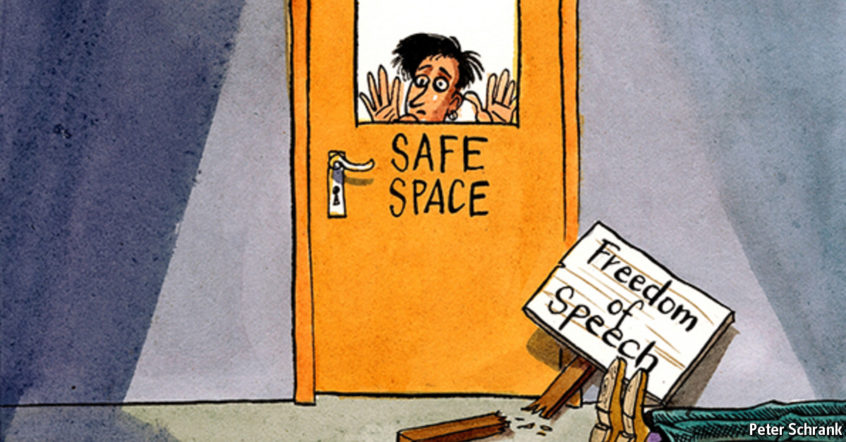With the civilized world reeling from the Islamic State’s “no-lives-matter” terrorism, it’s worth recalling how General George Patton inspired college-age G.I.’s to vacate their safe spaces for D-Day’s virtual suicide mission. Rallying them to Think Again about their lives’ purpose, Patton’s micro-aggression-laced appeal established, “Americans play to win.”
Could college students cocooned on today’s morally confused campuses appreciate such stridency in defense of liberty, or would they banish Patton as they have other unfashionable voices, including former Secretary of State Condoleeza Rice?
“We’ll win this war,” Patton proclaimed, “by fighting and showing the Germans that we’ve got more guts than they have…. We’re not going to just shoot the bastards,” he clarified, “we’re going to rip out their living goddamned guts and use them to grease the treads of our tanks.”
Responding more fearlessly than today’s campus “crybullies” could fathom, Patton’s troops helped crush Nazism while others extinguished Imperial Japan, ending tyrannical threats to “life, liberty and the pursuit of happiness.”
Seven decades after winning World War II, the greatest threat to individual rights is not Islamic radicalism, but a fading commitment to bedrock democratic values – free expression, equality under the law, and pluralism.
As Abraham Lincoln understood, “America will never be destroyed from the outside. If we falter and lose our freedoms,” he predicted, “it will be because we destroyed ourselves.”
To appreciate the freedoms we’re in jeopardy of losing – and the medievalism to which jihadists want to return – recall humanity’s condition before our rights-assuring ideals civilized the world. As 17th-century philosopher Thomas Hobbes described, life was “solitary, poor, nasty, brutish and short.”
Oscar Wilde once observed how America’s youth, “are always ready to give to those who are older than themselves the full benefits of their inexperience.” Proving Wilde’s point, 40 percent of millenials support government restrictions on offensive speech, according to a recent Pew poll, compared to 12 percent of seniors.
That America’s youth disproportionately favor speech suppression explains headline-grabbing campus meltdowns – and refusals by Chris Rock and Jerry Seinfeld to perform for students too sensitive to take a joke.
Most distressing is how adults charged with teaching the young to thrive in a world of potential offenses are ceding control to children who are ill-equipped to govern themselves never mind society, creating what essayist Joseph Epstein calls “Kindergarchy.”
Instead of learning how to cope with divergent ideas, values, and speech, many young adults in our Kindergarchy invert the Golden Rule, doing unto others what they wouldn’t want done to them. Increasingly, they’re disrespectful – even hostile – to those with different viewpoints.
Consider these campus absurdities: Mount Holyoke canceled “The Vagina Monologues” for lack of “transgender inclusivity”; Wesleyan’s student government cut funding for a newspaper that published an “offensive” op-ed; Columbia students claimed Greek mythology “marginalizes student identities,” requiring trigger warnings; Brown created a secret group for discussing controversial topics freely; Amherst activists demanded banning free speech posters.
Under pressure to promote the toxic concept of “microaggression” (subconscious bigotry), University of California campuses discourage phrases deemed offensive, including “America is the land of opportunity,” and “There’s only one race, the human race.”
Missouri’s recent protests over alleged racism devolved into demands for the now former university president to write a handwritten resignation letter apologizing for “white, male privilege.”
Yale’s debate over potentially insensitive Halloween costumes morphed into outrage after a faculty member suggested, “free speech and the ability to tolerate offence are the hallmarks of a free and open society.” Is there room, she wondered, to be “obnoxious,” “inappropriate,” or offensive” on campuses that are increasingly “places of censure and prohibition?” In response, a student whined, “I don’t want to debate. I want to talk about my pain.”
In their widely-discussed Atlantic essay, “The Coddling of the American Mind,” co-authors Jonathan Haidt and Greg Lukianoff argue “teaching students that their emotions can be used effectively as weapons…may be training students in thinking styles that will damage their careers and friendships, along with their mental health.”
Herein lies the problem with the “victimhood culture” that permeates our Kindergarchy – it disempowers and hurts people. Wouldn’t young adults “be better prepared to flourish,” Haidt and Lukianoff ask, “if we taught them to question their own emotional reactions, and to give people the benefit of the doubt?”
Ultimately, coerced silence kills democracy for as Edmund Burke noted, “the only thing necessary for evil to triumph is for good men to do nothing.” Americans have always been a people willing to do something about evil, but as Patton understood, defeating evil is a choice, not a destiny.
To secure the open and vibrant society from which America’s creativity, prosperity and decency spring, we must continuously defend our democratic values, at home and abroad.
Think Again – without America as a bulwark of liberty, how will the Islamic world ever embrace freedom and modernity?

